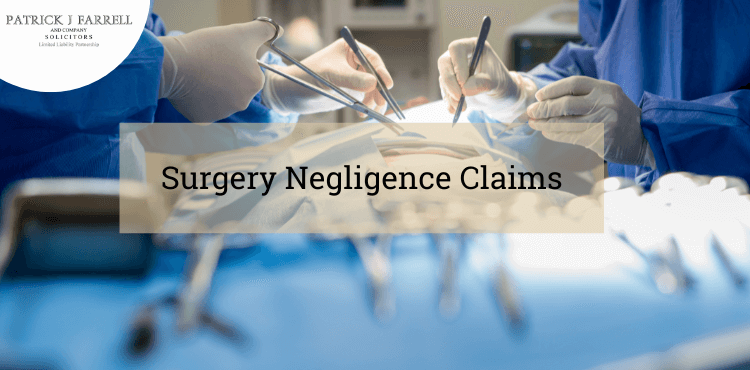Surgery Negligence Claim Solicitors


Surgical procedures require the highest standards of care, skill and expertise.
When these standards are not met, and negligence occurs, patients can suffer significant harm and potentially life changing results.
In Ireland, surgery negligence claims represent a vital aspect of medical negligence law, providing a pathway for patients to seek compensation and justice.
This guide offers an in-depth look at surgery claims, including what they entail, common types of surgical negligence, the consequences of negligence, and how to pursue a surgery negligence claim if you or a loved one has been affected.
Medical Negligence Solicitor
Helen Coughlan is a partner and advises on medical negligence*, family law and personal injuries*. Helen is a qualified family mediator and collaborative law practitioner and is Chairperson of the Family and Child Law Committee of the Law Society.
Medical Negligence Solicitor
Emma Farrell is a partner and advises on medical negligence* and personal injuries*. She qualified with the largest solicitors’ firm in Ireland and has significant expertise.
Surgery negligence occurs when substandard surgical care leads to patient harm. With claims usually involving legal action taken against the healthcare professionals or institutions at fault.
Claims can arise from a range of surgical settings, including elective procedures, emergency operations, and post-operative care.
Incidents of surgery negligence can be varied but some of the most common types include:
Incidents of surgical negligence can often have serious, life-altering consequences, such as:
Understanding the common causes of surgery negligence can help in identifying potential claims. Several factors can contribute to surgical, including:
The first step in making a surgery negligence claim is to consult with a solicitor experienced in this field. Medical negligence law is complex, and a specialised solicitor can provide you with advice tailored to your specific situation.
They will assess the merits of your case, help you determine whether you are eligible, advise you on the likelihood of success, and guide you through the process.
Patrick J Farrell Solicitors specialise in medical negligence, don’t hesitate to contact us regarding your concerns and to see if you’ve potentially been involved in medical negligence.
Your solicitor will request your complete medical records, which are crucial for supporting your claim. You will need to compile all of your medical records, correspondence, and any other documentation related to your care. These provide evidence of the care you received and are essential for establishing a case of negligence.
It may be necessary to have an independent medical expert evaluate your case to establish whether the care you received was substandard and constituted negligence.
Once your solicitor has gathered all necessary evidence, they will draft a Letter of Claim and notify the hospital or healthcare provider that you intend to take a case against them. Your Letter of Claim outlines the details of your claim, the alleged cause of negligence, and the resulting harm or injury.
The hospital or healthcare provider, through their own legal team, will respond to your Letter of Claim. They can either accept responsibility and work towards a settlement; or they can dispute the claim which will lead to legal proceedings.
Many claims are settled out of court, and your solicitor will negotiate on your behalf to arrive at fair compensation for your injuries, any financial losses, and any future care needs. However, if a settlement can’t be reached, your case may proceed to court where your solicitor will prepare for and represent you in any court proceedings.
Surgical negligence claims can be highly complex and typically require a deep understanding of both medical and legal practices. If you believe you have been a victim of surgical negligence, we highly recommend you seek expert legal guidance.
If you or a loved one has suffered due to surgical negligence, contact us today for a consultation. Our expert team is committed to providing the compassionate guidance and support you need to achieve the best possible outcome.
At Patrick J Farrell & Company Solicitors, we understand the profound impact medical negligence can have on your life. With a legacy founded by Patrick J. Farrell and carried forward by a dedicated team, we have been advocates for justice for over four decades. Our commitment to putting our clients’ interests first, combined with our extensive legal expertise, makes us the ideal partners in your pursuit of justice.
From the moment you walk through our doors to the resolution of your case, you’ll be treated with the utmost courtesy, respect, and understanding. Choose us – where your well-being is our top priority. Reach out to us today and let our experienced solicitors guide you every step of the way.
Delayed Diagnosis ClaimsHow To Make a Medical Negligence Claim
Making a Medical Negligence Claim
Birth Injury Claims: Guide to Concerns and Compensation
Will Irish healthcare issues cause an increase in medical negligence claims?
Plastic Surgery and Cosmetic Procedures
Hip replacements and joint replacements
Understanding Healthcare-Associated Infection (HAI) Claims
Hip replacements and joint replacements